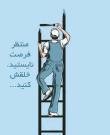تاریخ : سه شنبه 90/2/27 | 3:11 عصر | نویسنده : دیدن صفحه اصلی وبلاگ
درمان رفتاری فشرده سه ساله اوتیسم کودکان را بهبود می دهد
بر اساس پژوهش گذشته، "کارد" کشف کرد که بسیاری از این کودکان افزایش قابل توجهی در کارکردهای شناختی و انطباقی، و نیز زبانی، خود داشته اند.بیشتر این کودکان همچنین بهبودهای چشمگیری در کارکردهای مدیریتی خود بروز دادند.
خبر از: پژوهشکده علوم شناختی
---------------------Study Reveals Children Recover from Autism with Intensive Three-Year Behavioral Therapy
Main Category: Autism
Also Included In: Psychology / Psychiatry
MNT |Article Date: 13 Nov 2010 - 1:00 PST
A landmark study proves that children are capable of recovery from autism, or of making substantial gains in cognitive and adaptive functioning, as well as language skills, according to results released last night by Dr. Doreen Granpeesheh, founder of the Center for Autism and Related Disorders, Inc. (CARD).
The three-year study, which the State of Arizona funded and CARD, the world"s largest provider of early intensive behavioral intervention for children with autism, conducted, evaluated the effects of behavioral intervention for 14 young children with autism using a version of Applied Behavior Analysis (ABA) that blends structured teaching with play-based behavioral intervention. Today, 43 percent of the study"s participants no longer display clinical symptoms of autism and most of the participants demonstrate significant improvements in functioning.
In accordance with previous research, CARD found that many of the children made substantial gains in cognitive and adaptive functioning, as well as language skills. Most of the children also demonstrated significant improvements in executive functioning. After treatment, the average T-score for the group on the BRIEF, a measure of overall executive functioning, was 61, well below the cut-off for clinically significant impairment. In addition, 8 out of 14 children were functioning in the average range on the Vineland ABC, a measure of overall adaptive functioning, whereas only 2 of 14 were in the average range before treatment began.
"Years ago, some doctors would tell parents that they should institutionalize their children after an autism diagnosis," said Dr. Granpeesheh. "Today, we know that autism is treatable and recovery is possible with the right services. Every child deserves a chance to learn and grow, and we hope that these results provide hope to families of newly diagnosed children."
Among the study"s major findings is that children who developed language skills early in therapy made greater gains over time. The children who did not recover from autism still made substantial gains in their abilities to communicate and live independently. Even the children whose progress was slowest experienced significant decreases in challenging behaviors and increases in independent communication and leisure skills, thereby resulting in improved self-reliance and quality of life.
"My daughter is now recovered from autism," said Elizabeth Howell, parent of a study participant. "When people meet her and interact with her, they cannot believe that she ever had an autism diagnosis."
All children in the study received 25 or more hours per week of one-on-one teaching and therapy. A careful assessment of each child"s strengths and deficits led to targeted teaching programs. Treatment plans were based on children"s motivations and activities were based on their interests.
"The behavioral intervention was intensive, comprehensive and high-quality," said Dr. Amy Kenzer, CARD research manager. "These factors play a major role in the outcomes observed."
Autism is a pervasive developmental disorder that is marked by the presence of impaired social interaction and communication and a restricted repertoire of activities and interests. Autism is estimated to affect as many as 1 in 110 children in America and is four times more common in boys than in girls.
Source: Center for Autism and Related Disorders, Inc
.: Weblog Themes By Pichak :.

